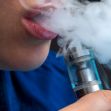The U.S. Supreme Court is set to hear arguments on Monday in a case concerning the Food and Drug Administration’s (FDA) authority to regulate flavored e-cigarette products. The case, which pits the FDA against e-cigarette manufacturers Triton Distribution and Vapetasia, centers on whether the agency followed proper legal procedures under the Administrative Procedure Act (APA) when it denied the companies’ applications to market their nicotine products.
In 2020, Triton and Vapetasia submitted applications to the FDA to sell flavored vaping products with names such as "Jimmy The Juice Man Peachy Strawberry" and "Suicide Bunny Mother’s Milk and Cookies." These flavors, critics argue, are designed to appeal to children. The FDA rejected the applications, citing the "known and substantial risk" flavored e-cigarettes pose to youth, and noting that the products failed to meet the public health standard required under the Tobacco Control Act. The FDA has approved only 34 flavored e-cigarette products, all tobacco or menthol-flavored, while denying applications for over a million other products, including those with candy, fruit, and dessert flavors.
The case arrives at the Supreme Court following a decision by the New Orleans-based 5th U.S. Circuit Court of Appeals, which ruled in favor of the companies. The appellate court found that the FDA acted “arbitrarily and capriciously” in violation of the APA. This decision contrasts with rulings from seven other federal appellate courts that upheld the FDA’s approach, creating a split that prompted the agency’s Supreme Court appeal.
This case has significant implications for public health, regulatory authority, and the role of the judiciary in reviewing scientific decisions by federal agencies. Under the Tobacco Control Act, e-cigarette manufacturers must demonstrate that their products are "appropriate for the protection of public health." This standard requires evidence that the health benefits, such as helping traditional smokers switch to less harmful vaping, outweigh the risks of introducing the product to the market.
The FDA contends that flavored e-cigarettes fail this test due to their appeal to minors. The agency’s findings show that nearly one in five high school students and one in twenty middle school students used e-cigarettes in 2020, making them the most popular tobacco product among youth. Flavored products, it argues, are a key driver of this trend.
The case also highlights the FDA’s enforcement challenges. Despite the rejection of numerous applications, flavored e-cigarettes remain widely available on the market. The FDA lacks independent litigating authority and depends on the Department of Justice to enforce its regulations, which has been reluctant to crack down on unauthorized products.
Legal and public health experts are closely watching how the Supreme Court will handle the balance between regulatory authority and judicial oversight. The FDA argues that its decisions are grounded in science and are essential for protecting public health, especially for vulnerable youth. Mark Gottlieb, executive director of Northeastern University’s Public Health Advocacy Institute, emphasized that "flavored vaping products simply cannot meet the public health standard because of their documented potential for creating new underage tobacco users."
On the other hand, e-cigarette manufacturers argue that the FDA’s decision-making process has been opaque and inconsistent. The companies describe the regulatory process as a “Kafka-esque” ordeal, with unclear requirements that make compliance nearly impossible. This argument swayed the 5th Circuit, which suggested that the FDA’s handling of the applications was flawed.
This case provides the Supreme Court with another opportunity to weigh in on the power of federal agencies, following recent decisions that have limited their authority. A ruling against the FDA could weaken its ability to regulate e-cigarettes and potentially set a precedent for challenging other public health regulations.






